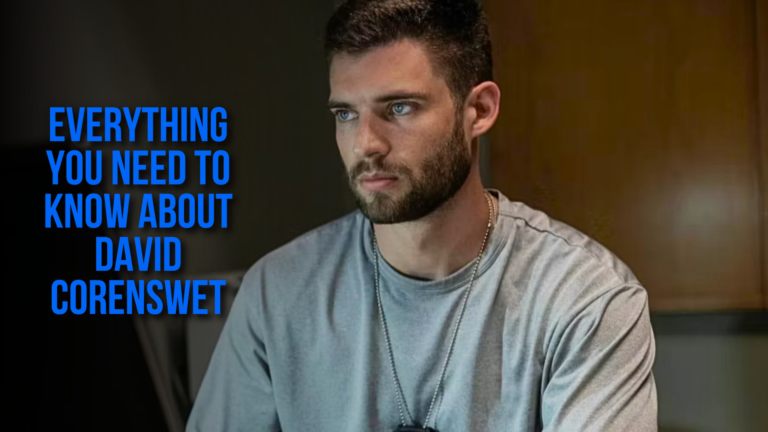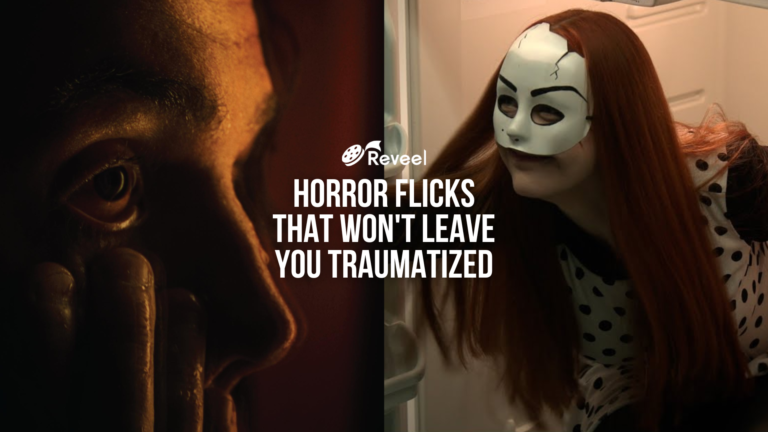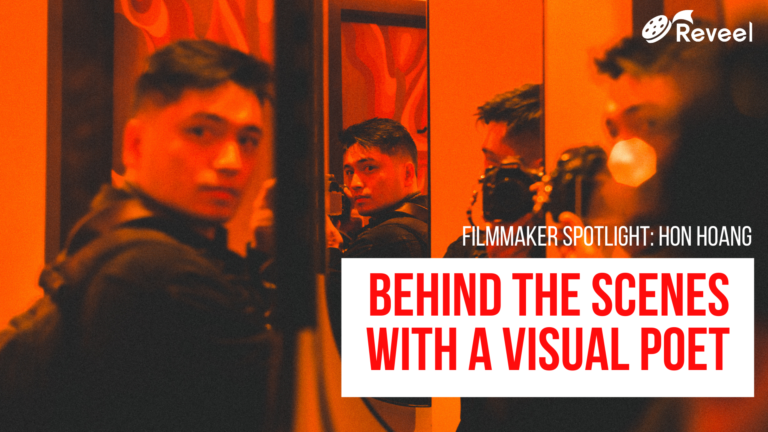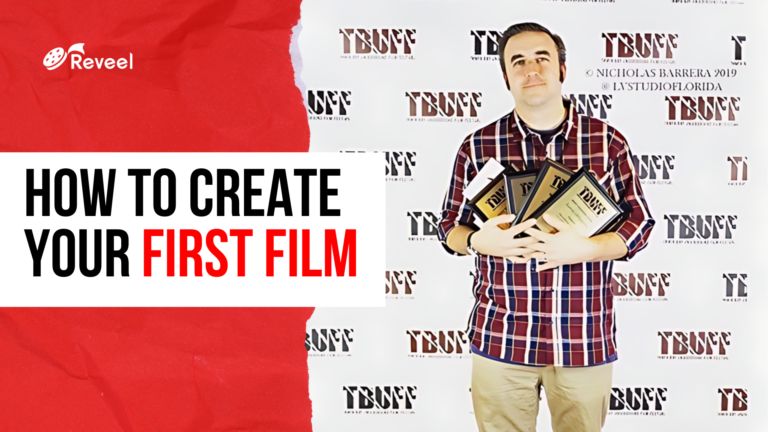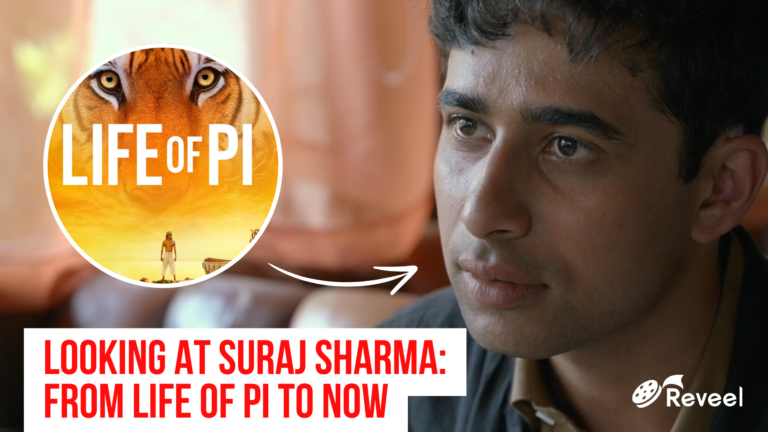According to the Alzheimer’s Association, 6.5 million Americans age 65 or older are living with Alzheimer’s dementia. Alzheimer’s has a devastating effect on the brain that can be difficult for those without the disease to understand. Films about Alzheimer’s aren’t always the most accurate but they can be used to help depict what it’s like to live with the disease. Josh McCausland, owner of iQ flicks, decided to create a short film titled “Anamnesis” for that exact reason. Based on his family’s experience with the disease, McCausland created a film that gives viewers a glimpse at the emotional turmoil that comes with living with Alzheimer’s dementia.
We’ve interviewed Josh McCausland to take a closer look at the production of Anamnesis and the story behind it.
The following interview has been edited for clarity and length.
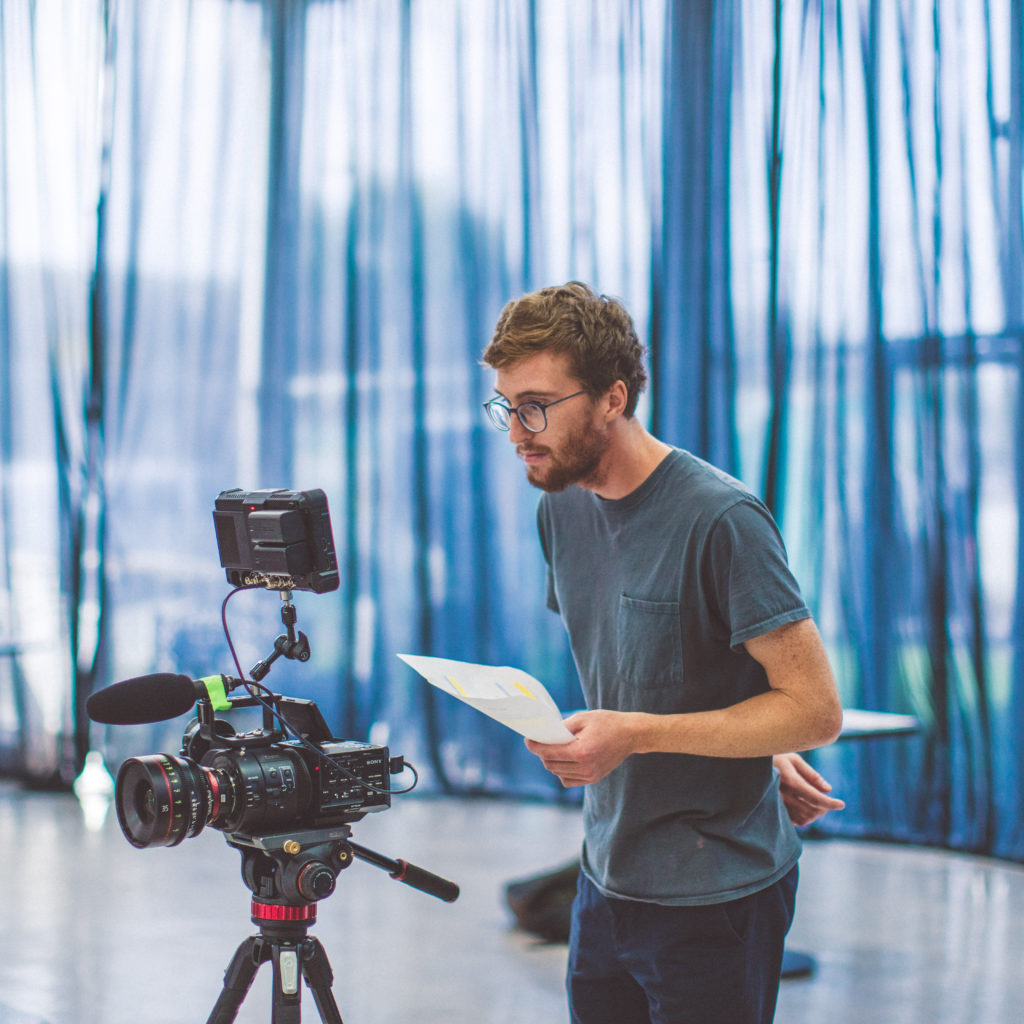
Josh McCausland on the set of Anamnesis
1. In your own words, can you tell us what Anamnesis is about and why you felt the film needed to be made?
Josh McCausland: Anamnesis is a film that depicts the abstract journey that a man’s subconscious takes as he dives deeper into his struggle with Alzheimer’s.
The film is dedicated to my grandparents. After my grandmother passed away in 2010, I saw how her absence affected my grandfather with Alzheimer’s. His condition got worse and worse until his passing in 2018. I wanted to tell this story of loss in an ephemeral type of experience that shows my grandmother reaching out beyond the grave.
2. A one-take is a very unique style of filmmaking, what made you decide to use it to tell this story? What was the most difficult part about shooting a one-take?
Josh McCausland: I think with a one take, everything is difficult. For me, I’m really into theater. In college, I was very involved in theater and directed a couple of shows. Theater has always seemed more real to me whereas typical film is very polished and beautiful. With one-takes, if things aren’t super polished, you feel like you can connect to the film more because every moment matters. And that was really the approach I wanted to take because every moment does matter in the last stages of your life. Every second counts.
The most difficult part about shooting the one-take was syncing up the music with the action on set. So, I actually created the music before shooting the film. The music was done first and then we had to speed it up while filming at a higher frame rate so that when we slowed things down in post, everything would line up.
Honestly it was just difficult getting everything right on set. We ran weeks of rehearsals to get everything right and we had a large TV behind the camera that cued cast and crew members in when they needed to do something for the scene. The timing was difficult and there was one specific moment where Vienna, who plays the wife, walked off screen and we had about ten seconds to hook her into a harness before she walked back into the shot. I remember telling everyone that this is the one moment where we have to just nail it! It was technically difficult but we pulled it off. We had an amazing crew.
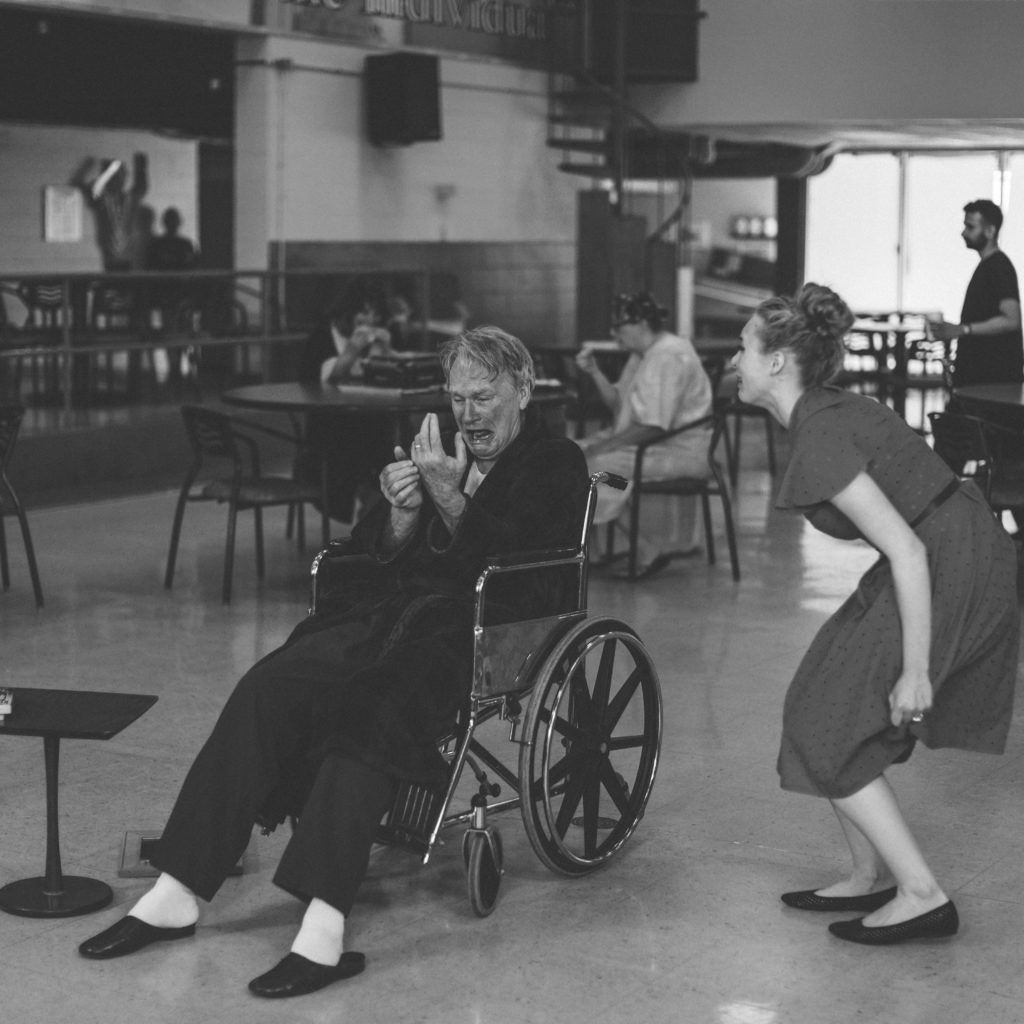
Bruce Shaw and Vienna Dohler as George and Anne in Anamnesis
3. With such a personal story behind the film, what did you look for when casting the two leads?
Josh McCausland: When I cast Vienna Dohler as the wife, I had never seen her act before. Vienna was a friend of mine who was a super talented musician in Nashville. She really resonated with the story because she also had grandparents who struggled with Alzheimer’s. She did some acting in the past and wanted to be a part of the film.
Bruce Shaw, who plays the lead, had parents who struggled with Alzheimer’s. I had never seen Bruce act before but we met one day for lunch and talked for hours about Alzheimer’s and the effect it has on people. I thought he was perfect for the role. I hadn’t seen him act but if you have a great rapport with actors, you can get a great performance out of anyone!
4. The short film manages to be very emotional without many lines of dialogue, was it intimidating to direct the film using mostly visuals? What methods helped you bring the beautiful performances out of the two leads?
Josh McCausland: No actually, it wasn’t intimidating! I am a huge silent film fan. I grew up watching silent films and music videos. I’ve always been a man of few words in film and in life. I’m also really into interpretation. So I don’t like to dictate a story for somebody that they could find a different meaning in. In Anamnesis, I didn’t want too much dialogue for the film because at those later stages with Alzheimer’s, it’s hard to communicate. It’s hard to communicate where you are coming from. We never know what’s going on inside their heads. So the whole point of creating the dichotomy of emotions and reality bending together was to capture the confusion of what’s happening in the character’s eyes.
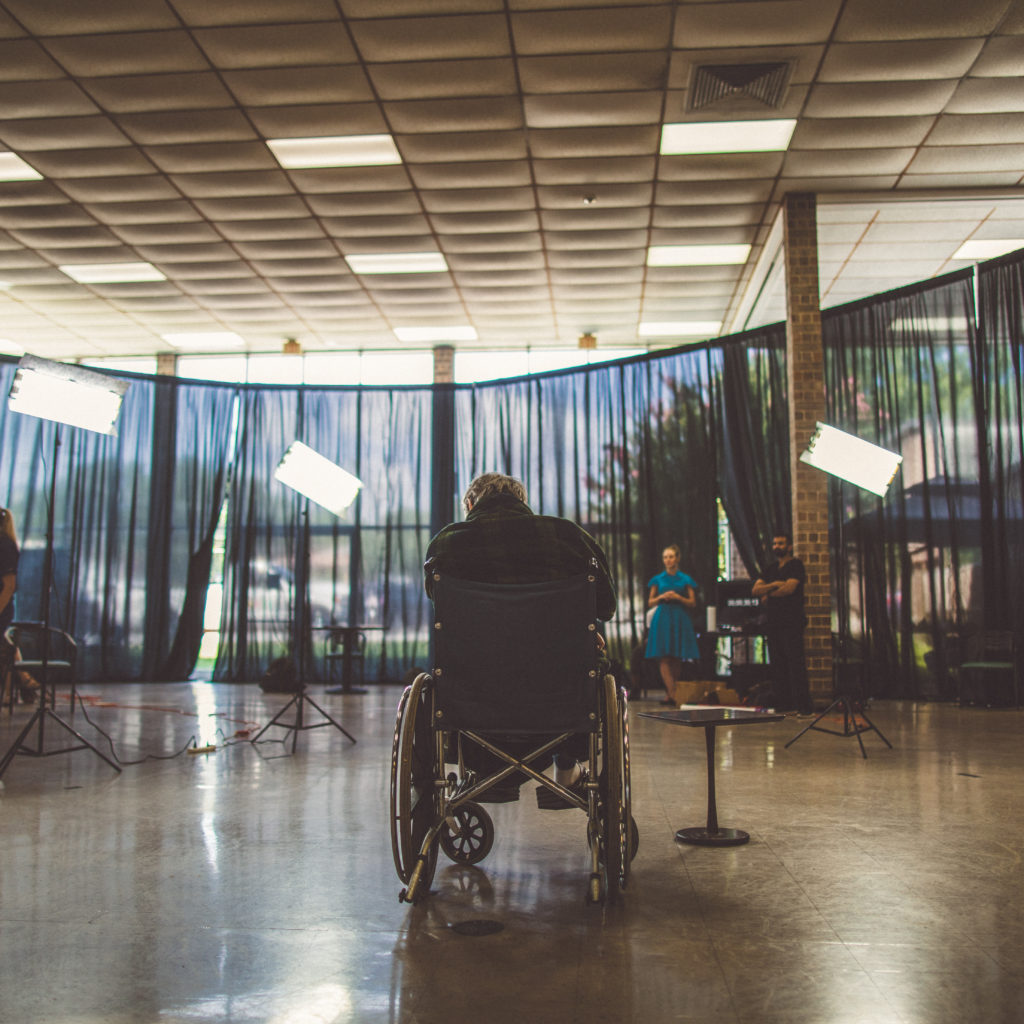
Bruce Shaw on the set of Anamnesis
5. Since the film is centered around a disease that affects a great number of people, did you find yourself getting a lot of support for the film either during production or after the film was released?
Josh McCausland: Yeah, the film was made to raise awareness for Alzheimer’s. We didn’t make a profit from the film and I approached the Alzheimer’s Association about a partnership to create the film. All of the proceeds from the film went to the Alzheimer’s Association. I needed to tell this story for this moment of my life because I think I have a fear that I might have Alzheimer’s one day. In all of the work I do I want to anchor it to a point in my life so that I can look back and remember it.
As far as support goes. Everyone that was a part of the cast and crew had a relative or a spouse or knew someone who had Alzheimer’s. Everyone really wanted to be a part of the project because of how Alzheimer’s has affected their lives. During production, we had many partners. The location we filmed out of is actually an assisted living home that they allowed us to use. The Alzheimer’s Association helped cover costs for the day of production which was awesome! And then we threw a big event for the screening where we had doctors and psychologists that did a panel for Alzheimer’s. It was really cool for me to take a step back from the event and have the event really be about promoting awareness for Alzheimer’s.
We had a man come to the event who had early onset Alzheimer’s and he was in tears after the film was over. It was a strange experience for me because I broke this man’s heart. He told me he was gonna go through this.
I had a premiere in Ohio for only my family as well which was really important for me. The most rewarding part about the whole experience was to see my dad and my brother in tears because they had lived this story.
6. You seem to be a man of many talents in photography, filmmaking, and music especially, so my question is what does art mean to you?
Josh McCausland: I could say so many things but art for me was always a necessity for survival more than just a “want”. I think art is different for everybody. It has a different definition for each person. For me, it was very integral to my character. Art is everywhere and everything, as cliche as it sounds!
I have a cyclical process of creation where if I’m stuck in film, I go to music. If I don’t know where to go in music, I shoot some photos. Every medium keeps each other inspired. I may make some music and be like dang this could be a film. Then I start the pre-production process.
Art is like this strange thing that is always around and you can never really get rid of it whether you want to or not.
7. Here’s a fun one. Who are your filmmaking influences?
Josh McCausland: David Fincher is up there for me. He’s the best. Everything he touches. I like that he hits on the darker side of life. For me, there is a lot of room for that in my brain. I think Sam Mendes is also one of my biggest inspirations too. He’s crazy talented and he works with Thomas Newman all the time and Thomas Newman is one of my heroes. But David Fincher for sure. He is probably my number one. Everytime I get asked this question I hang up and realize oh shoot I should’ve talked about this person! My favorite film of his would be between Gone Girl and The Curious Case of Benjamin Button. They are like chef’s kisses.
Anamnesis is a film that dives into a man’s conscious and unconscious mind as the physical and imagined world blend in front of him through his struggle with Alzheimer’s disease. Watch the short film for free on Reveel.
All-Time Popular Blogs
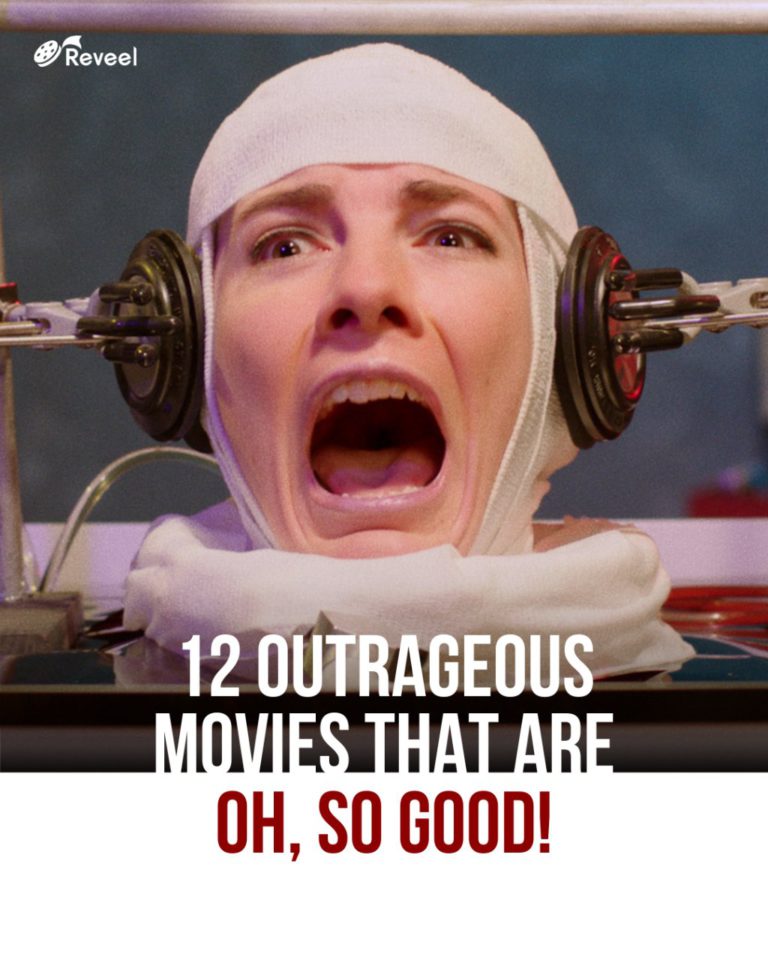
12 Horror Movies So Ridiculous – Ridiculously Good
We all know the allure of a good guilty pleasure flick — movies so ludicrous and outlandishly executed that we can’t help but be bowled over by the audacity. Welcome...
Read More
Best Free Filipino Movies You Can Watch Right Now
“There’s always a Filipino somewhere” is a well-known fact, and it’s true even in streaming platforms. Of course we have some right here in Reveel. From the adrenaline-infused streets of...
Read More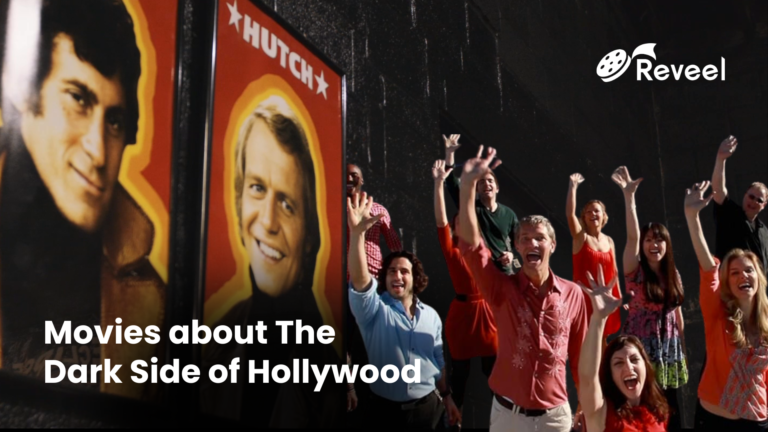
Movies about The Dark Side of Hollywood and Fame
The darker side of Hollywood—the side rife with scandal, exploitation, and the unyielding pressure to remain in vogue—is a tale as old as cinema itself. Yet, these stories never fail...
Read More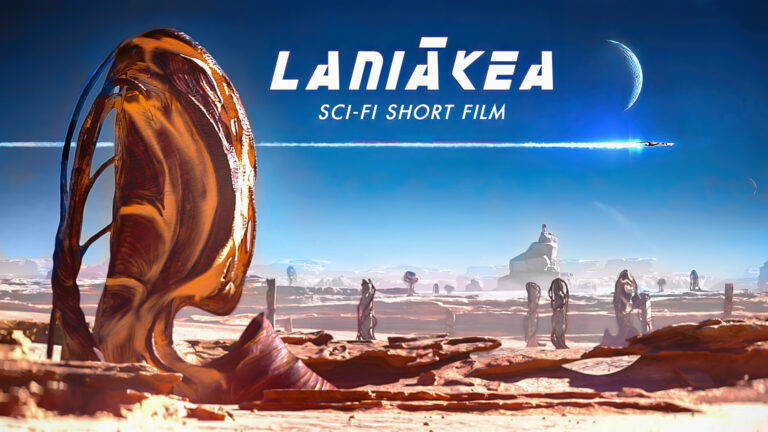
Reveel Interviews Dima Taran: The Filmmaker Behind The Animated Short ‘Laniakea’
What if we are alone in the universe? This question is at the core of the short film Laniakea. Originally created as a college project by Dima Taran, the film...
Read More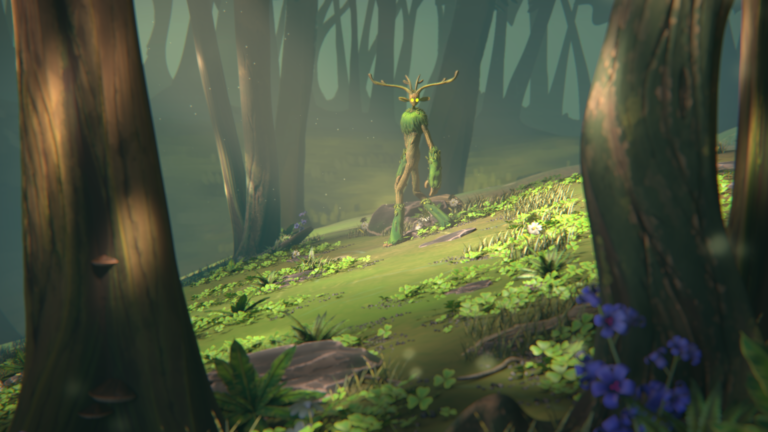
5 Best Animated Short Films To Watch For Free On Reveel
Sometimes the best stories aren’t the longest, they are the shortest. Short films have perfected the art of telling a captivating story in just a few minutes and animated shorts...
Read More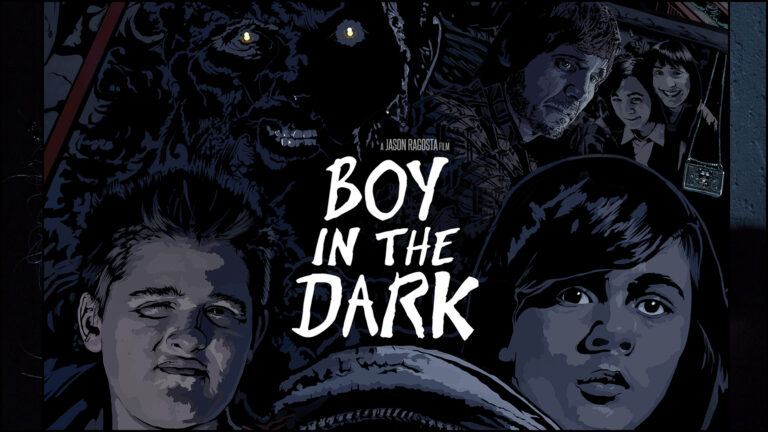
Reveel Interviews Jason Ragosta: The Filmmaker Behind The Short ‘Boy In The Dark’
Most, if not all, children had night terrors growing up. Some would hide under the covers. Others would yell for their parents. Kid-version Jason Ragosta, screenwriter and director, decided to...
Read More
